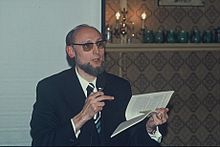Arcaicam Esperantom
It was created by linguist Manuel Halvelik [eo] as part of a range of stylistic variants including Gavaro (slang) and Popido (patois), forming Serio La Sociolekta Triopo.
Halvelik also compiled a scientific vocabulary closer to Greco-Latin roots and proposed its application to fields such as taxonomy and linguistics.
[1] The idea of an "old Esperanto" was proposed by the Hungarian poet Kálmán Kalocsay[2] who in 1931 included a translation of the Funeral Sermon and Prayer, the first Hungarian text (12th century), with hypothetic forms as if Esperanto were a Romance language deriving from Vulgar Latin.
La Sociolekta Triopo (the sociolect triple) does not create new Esperantidos (e.g. Esperanto II), but its sole purpose—including Arcaicam Esperantom—is to reflect styles in literature translated into Esperanto, like the Berlin Middle-German dialect spoken by characters in Carl Zuckmayer's Captain of Köpenick (Popido), or ancient styles in Walter Scott's Ivanhoe (Arcaicam Esperantom).
[3] La Sociolekta Triopo thus constitutes not three new constructed languages, but constructed auxiliary sociolects for Esperanto, understandable by every reader of Esperanto but still providing the stylistic differences between dialects (Popido), slang (Gavaro), and ancient forms contrasting with Fundamento, standard Esperanto, e.g. in works of Mark Twain (slang and southern dialect) or The Lord of the Rings (Arcaicam Esperantom for the elves, Popido for the Hobbits).
[4] Pronouns are changed as: *herself/himself/itself/themselves Ex: The modern Esperanto verb esti (to be), present tense: The Arcaicam Esperantom verb estir (to be), present tense: The other verb tenses behave the same way, as does the conditional mood: The imperative mood behaves differently from that pattern: mihi mihes mihin mihid mihiam tu tues tuin tuid tuam lùi lùies lùin lùid lùiam eshi eshies eshin eshid eshiam eghi eghies eghin eghid eghiam nos noses nosin nosid nosam wos woses wosin wosid wosam ilùi ilùies ilùin ilùid ilùiam sihi sihes sihin sihid sihiam (Note: Ali-, which in modern Esperanto is not a correlative despite its use in that fashion by some, becomes in Arcaicam Esperantom as altri- a full-fledged correlative.)
Version with cognates in standard Esperanto: Patro nia, kiu estas en Ĉielo, Estu sanktigita Cia Nomo.
Ne estu plu Ŝia servanto, se ŝi cin envias: Ŝia vestala robo verda Kaj malsaneca estas, kaj sole frenezuloj Volonte ĝin portas.

